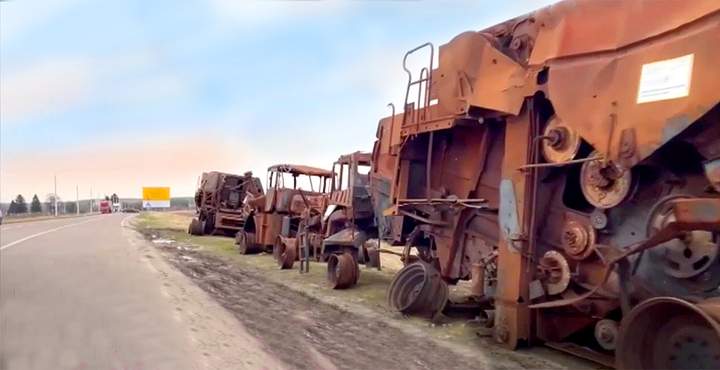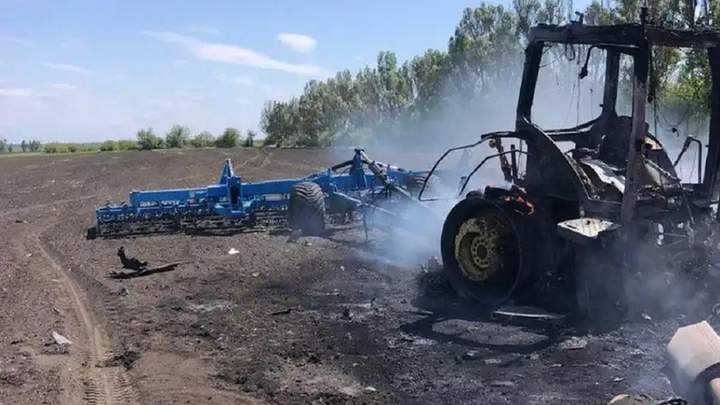The shot equipment of Ukrainian farmers was brought to the Polish border (video)
The blockade of the Polish-Ukrainian border by farmers from the neighboring country goes beyond common sense: the information that Ukrainian grain remains in Poland has not been confirmed.
Despite this official statement, Polish farmers are tightening the blockade even more, stopping passenger and railroad traffic in some places. However, their main goal is to block the grain corridor.
To help Polish farmers see the cost of this grain to Ukrainian farmers, our carriers collected agricultural machinery from the affected regions that had been burned by shelling or hit by mines in the field.
To demonstrate the hard-fought harvest of grain and root crops, the tractors, combines and other equipment that had been destroyed by the war were taken to the Polish border yesterday. This is a proof of the conditions in which we have to grow, care for and harvest crops.
At the same time, it is a hint that a real farmer will not pour grain onto the ground from trucks or railroad cars and that the Protestant ranks have been infiltrated by figures far removed from the agricultural sector and supporters of the Putin regime.
Whether this will reach the farmers’ protesters is a big question, because it is not so much economics as politics that is involved. Polish Prime Minister Donald Tusk has already recognized and emphasized this: “We cannot allow those who openly and actively serve Vladimir Putin’s propaganda to take advantage of the farmers’ protest on the border with Ukraine. Slogans in support of Putin’s narrative are high treason. We will not tolerate this in any way. I hope that both the protesters and all the services will draw the right conclusions from this.”
It is known for certain that none of the accusations made by the organizers of the farmers’ protests about Ukrainian grain left in Poland have been confirmed. This was stated by Deputy Minister of Agriculture Michal Kolodziejczak on Tuesday, February 20.
“No wheat, no corn, no rapeseed. These products do not stay here,” Kolodziejczak emphasized and suggested that farmers protest at another border, not necessarily the Ukrainian one.

However, analysts argue that protests on other borders will not be as painful for the authorities, but blocking travel to Ukraine will be more painful and the Polish government and the European Union will be more likely to make concessions.
The issue of agricultural products from Ukraine, mainly grain, is neither first nor second among European farmers, but somewhere between third and fourth or fifth. For several weeks now, farmers in many EU countries have been taking to the streets and demanding, first and foremost, a complete rejection of the EU Green Deal, as they fear the consequences of its implementation.
For example, they don’t want to set standards for 4% of the land’s vapor content. Of course, they are demanding a ban on imports of certain goods from Ukraine and stricter control over those imported to the EU.
In Poland, the narratives are completely different. Polish farmers created chaos and disorder on the border with Ukraine. According to RMF FM correspondent Mateusz Chłystun, the blocking of four checkpoints on the border with Ukraine is increasing the queue of trucks waiting for customs clearance on the Polish side.
Drivers have to wait as long as 197 hours for customs clearance in Medyka, 143 hours in Korchova, 150 hours in Hrebenne, and 113 hours in Dorohusk.
That is why Ukrainian carriers delivered damaged equipment of Ukrainian farmers to the border, demonstrating to our neighbors the problems of the Ukrainian agricultural sector in the context of war.
Prime Minister Tusk said yesterday that to ensure that military and humanitarian aid to Ukraine can pass without the slightest obstacles or delays, the border crossings with Ukraine and certain sections of roads and railways will be added to the list of critical infrastructure. In general, this was long overdue, as such strikes and traffic blockades, and even more so damage to cargo, would be equivalent to criminal offenses and even terrorist acts at such facilities.


